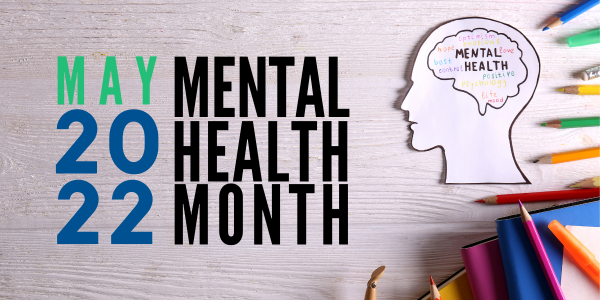
This month, United Way of Sheboygan County (UWSC) is proud to bring attention to mental health and help reduce the stigma that impacts so many in our community by honoring Mental Health Awareness Month.
Mental health is an integral part of one’s overall health. The significant increase of individuals, especially youth, experiencing mental health symptoms is worrisome and highlights the need for continued development and implementation of an effective mental health system.
According to the World Health Organization, as many as one in six U.S. children ages 6-17 has a treatable mental health disorder such as depression, anxiety, or attention deficit/hyperactivity disorder (ADHD). Yet, while half of all mental health conditions start by 14 years of age, most of these cases are undetected and go untreated. The consequences of not addressing adolescent mental health conditions extend to adulthood, impairing both physical and mental health and limiting opportunities to lead fulfilling lives as adults.
To help address these barriers, UWSC, along with numerous community partners and donors, are taking important steps to help build a comprehensive school-based mental health system to fulfill the foundational elements needed to foster and sustain a collective impact model by increasing mental health services to students in our community.
UWSC’s Providing Access to Healing (PATH), a school-based mental health community impact initiative, places licensed professional clinicians directly in the school setting, which expands access to mental health care for students throughout Sheboygan County. PATH removes financial and geographical barriers while reducing inequities which enables all children to have a better chance of good mental health.
Since the inception of the program in 2015, over 1900 students have been served by PATH. Highlighted benefits include improved school performance and behaviors (62 percent), a more positive outlook on life (90 percent), improved relationships (91 percent), and feeling better understood (98 percent) and decreased anxiety and depressive symptoms. While these outcomes are something to celebrate, there is still much work to be done. Many of the school districts' PATH services have growing waitlists, totaling hundreds of students who need mental health services.
With mental health becoming a focal point of our conversations, it is critical that everyone has a solid foundation of knowledge about mental health and where to find resources. This year, Mental Health America (MHA) has focused on helping us get “Back to Basics,” by re-centering us on what mental health is, how we can support our mental health, and what resources are available to help. Click here to learn more and to hopefully empower you to push the conversation forward.
If you or a loved one is experiencing symptoms of a mental health condition, I want you to know that you are not alone, there is help, and there is hope. You can start by taking MHA’s free, online, clinically validated screenings. They offer a youth mental health screen (for those under 12), an anxiety screen (12 and above), a depression screen (12 and above), and a parent screen. While online screenings are not a diagnosis, it is one of the quickest and easiest ways to determine if you, your child, and/or a loved one are experiencing symptoms of a mental health condition. You can also visit 211 Wisconsin or MHA Sheboygan, a local nonprofit mental health resource center and United Way Partner Agency, to be connected with a variety of services and resources, surrounding mental health and more, in our area.
I end this by sharing the importance of collective impact, which helps to provide vital mental health resources, set children up for success, ensure basic needs are accessible, help our neighbors improve their well-being, and the list goes on. If we, as a community, believe that every child has an equal chance to thrive, then we need to continue to come together to promote the importance of wellness of body, mind, and spirit.
- Brianna Heusterberg, Director of Providing Access To Healing (PATH)

To learn more about PATH and the partners involved, read the latest PATH Impact Report, or contact Brianna Heusterberg directly by emailing her at brianna@uwofsc.org.

